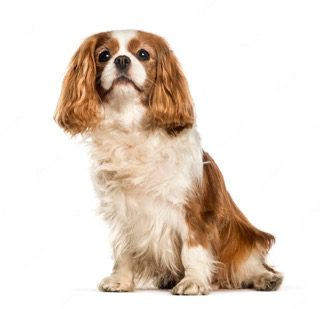
The Cavalier King Charles Spaniel is a small spaniel that originated in England in the 16th century. They were originally bred as companion dogs and were popular with members of the royal court. Cavaliers are sweet-faced, gentle-mannered, and brave. They have long ears that hang near their cheeks, a moderately long snout, large round eyes, and a moderately long silky coat. The breed comes in four colors: Blenheim (red and white), tricolor, black and tan, and ruby. Their long, silky fur, which is slightly wavy and found on their ears, chest, legs, and tail, is a distinctive trait and makes them stand out from other breeds. Cavaliers are known their intelligence, devotion to their owners, and cheerful dispositions. They are also known for their Trainability and adaptability. They are friendly and do well with other pets and children of all ages. They also love to be cuddled and fussed over, and make great lapdogs.
The Cavalier King Charles Spaniel is a gentle and friendly breed of dog known for their intelligence and playfulness. They have a patient and tolerant nature, so they get along very well with people, children, and other pets. Early puppy training and socialization is important though, as all breeds need to learn basic commands at a young age and become used to being around other animals and people. Exercise and activity needs are quite moderate for these dogs, who enjoy taking regular walks, runs, and playing games. They are also perfect for keeping indoors if you have the right size home, as they can be relatively quiet. They also form strong bonds with their owners and just love getting all the attention they can.
The Cavalier King Charles Spaniel is a beloved toy-sized dog breed with an insatiable appetite for life. They require an appropriate, well-balanced diet in order to stay healthy, happy, and energetic. It’s important to ensure that this breed gets all of the vitamins and minerals they need from their meals each day, as well as plenty of fresh water. High-quality dry kibble formulated for toy breeds is a great option for this type of breed. When feeding your Cavalier King Charles Spaniel, try to split their recommended daily calories into two smaller meals with the same proportions of protein, carbohydrates, and fats.
Interactive toys and rewards-based training can also help keep them active. Responsible ownership and adoption is key to keeping your cavalier in tip-top shape. Consider checking out Way Canina for more tips and information regarding this specific breed, including what foods they should and shouldn’t eat. In summary, the Cavalier King Charles Spaniel can be a joyous companion with a diet that’s tailored to their needs. By feeding them responsibly, providing plenty of mental and physical stimulation, and making sure they get the nutrition they need, you’ll be helping your four-legged friend stay fit and healthy.
The Cavalier King Charles Spaniel is a medium-size dog breed that is known for their playful, affectionate personalities. Common health issues and genetic predispositions in this breed include syringomyelia, patellar luxation, progressive retinal atrophy, and mitral valve disease. Regular check-ups with a veterinarian and keeping your pet up-to-date on vaccinations are important to protect their health and well-being. Prevention is key, so all recommended screenings should be pursued. Grooming needs for this breed include regular brushing of their silky coat, bathing or wet wipes, and cleaning their ears as needed.
The typical lifespan range for a Cavalier King Charles Spaniel is 10-15 years. Factors that can influence their longevity include genetics, diet, exercise, and healthcare. Ensuring your pet has access to quality food, exercise, socialization, and necessary preventive care can help promote a healthy life.
If you own a Cavalier King Charles Spaniel or are thinking about getting one, consider all the responsibilities that come with owning a pet and the pros and cons of owning this particular breed. Check out our blog posts and articles on Way Canina, where you can learn more about the lifestyle and wellbeing of the Cavalier King Charles Spaniel and compare it to other breeds of dogs.